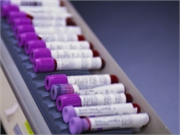- Could Your Grocery Store Meat Be Causing Recurring UTIs?
- Are You Making This Expensive Thermostat Error This Winter?
- Recognizing the Signs of Hypothyroidism
- 10 Strategies to Overcome Insomnia
- Could Artificial Sweeteners Be Aging the Brain Faster?
- Techniques for Soothing Your Nervous System
- Does the Water in Your House Smell Funny? Here’s Why
- Can a Daily Dose of Apple Cider Vinegar Actually Aid Weight Loss?
- 6 Health Beverages That Can Actually Spike Your Blood Sugar
- Treatment Options for Social Anxiety Disorder
Blood Count May Offer Clues to Treatment of COVID-19: Study

The severity of COVID-19 illness may be influenced by what researchers call “cytokine storms.”
In a new study, investigators assessed 522 COVID-19 patients, aged 5 days to 97 years, who were admitted to two hospitals in Wuhan, China, in December and January. The study also included a “control group” of 40 healthy people.
Compared to the control group, 76% of COVID-19 patients had significantly lower levels of T cells — a type of white blood cell that plays a crucial role in immune response against viral infections.
Patients admitted to the intensive care unit had much lower T cell counts than those who didn’t require ICU care. Patients over age 60 had the lowest T cell counts, the findings showed.
And the T cells that did survive in COVID-19 patients were exhausted and unable to function at full capacity, the study authors said.
COVID-19 patients also had high levels of cytokines — a protein that normally helps fight off infection. Too many cytokines can prompt an excessive inflammatory response called a “cytokine storm,” which causes the proteins to attack healthy cells.
That suggests the new coronavirus does not attack T cells directly. Instead, it triggers the cytokine release, which results in the loss and exhaustion of T cells, according to the authors of the study published May 1 in the journal Frontiers in Immunology.
The study results provide new clues on how to treat COVID-19, the researchers said.
“We should pay more attention to T cell counts and their function, rather than respiratory function of patients,” study author Dr. Yongwen Chen of Third Military Medical University in Chongqing, China, said in a journal news release.
Chen added that “more urgent, early intervention may be required in patients with low T lymphocyte counts.”
In addition, he noted, future research should focus on pinpointing subgroups of T cells that may be most important in COVID-19, along with identifying drugs that boost T cell counts and functioning.
More information
The U.S. Centers for Disease Control and Prevention has more on COVID-19.
Source: HealthDay
Copyright © 2026 HealthDay. All rights reserved.










